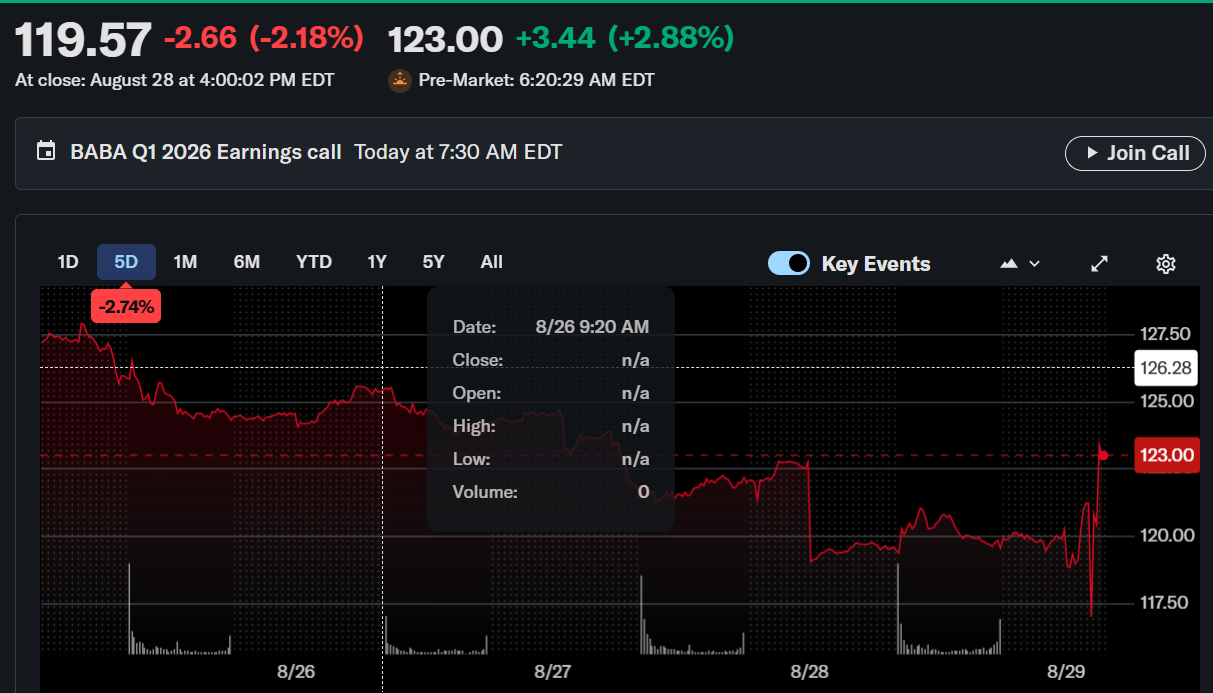Alibaba (BABA) Stock: Stunning Revenue Beat, Cloud Momentum Accelerates, Consumer Surge Powers Q1 FY26
Alibaba just delivered a quarter that made Wall Street's spreadsheets blush.
Revenue smashed expectations—no polite beating here, just outright domination. The cloud division? Charging ahead like it's got its own gravitational pull. Meanwhile, consumers are spending like there's no tomorrow—because in this economy, who knows?
Cloud Momentum: Not just growing—accelerating. Enterprises are flocking to Alibaba's ecosystem, dumping legacy systems for scalable solutions that actually work.
Consumer Surge: Shopping carts overflowing, digital wallets draining. Because nothing says 'economic confidence' like impulsive e-commerce sprees.
Yet another quarter proving that while analysts debate P/E ratios, real companies just print results. Maybe the suits should spend less time on financial models and more time actually understanding the business.
TLDR
- Alibaba Q1: Revenue beats, EPS miss; AI cloud and e-commerce fuel momentum
- Solid $34.6B revenue lift, Alibaba bets on AI cloud, commerce, and long game
- Alibaba rallies as Q1 shows AI cloud surge, e-commerce gains despite EPS slip
- Cloud revenue jumps 26%, Alibaba restructures to sharpen AI and commerce focus
- Alibaba Q1: Net income up 76%, cloud & commerce shine amid heavy investments
Alibaba(BABA) shares ended August 28 at $119.57, down 2.18%, but rebounded 2.88% in pre-market trading to $123.00.

Alibaba (BABA)
The recovery followed the release of its Q1 FY2026 earnings, which highlighted solid revenue growth and strength in its Core cloud and commerce units. Despite a slight earnings miss, Alibaba’s strategic focus on consumption and AI showed strong traction.
Solid Revenue Growth and Strategic Restructuring
Alibaba posted Q1 FY2026 revenue of $34.57 billion, topping analyst estimates of $34.2 billion by 1.1%. Growth stood at 2% year-over-year but climbed to 10% when excluding revenue from disposed businesses. Net income ROSE 76% to $6.02 billion, driven by mark-to-market gains and asset disposals.
However, non-GAAP EPS declined 10% year-over-year to $2.06, below the consensus estimate of $2.13. This was mainly due to increased investment in new initiatives and higher sales and marketing costs. Adjusted EBITA also dropped 14% to $5.42 billion, reflecting heavy spending on quick commerce and platform integration.
During the quarter, Alibaba restructured its reporting segments to streamline its operations. It consolidated Taobao and Tmall into a unified e-commerce unit and reorganized other business lines under simplified categories. The new structure aims to improve synergies and strengthen focus on strategic pillars.
Cloud Intelligence Accelerates with AI Surge
Revenue from the Cloud Intelligence Group surged 26% year-over-year to $4.66 billion, maintaining momentum from prior quarters. AI-related product revenue delivered triple-digit growth for the eighth consecutive quarter. Demand for AI computing and storage has significantly contributed to this performance.
Alibaba Cloud enhanced its position in the GenAI sector by expanding infrastructure and offering developer-friendly platforms like Model Studio and PAI. This bolstered adoption among enterprise clients and positioned Alibaba as a leader in Asia’s AI cloud market. Public cloud revenue, including external customer growth, remained the CORE growth engine.
The cloud division’s performance signaled strong scalability potential as enterprise AI adoption accelerated. Though infrastructure investments weighed on free cash flow, Alibaba continued funding cloud expansion to solidify its competitive advantage. Operating leverage from scale efficiencies is expected to improve over time.
China E-Commerce and International Units Drive Engagement
Alibaba’s China e-commerce segment grew 10% year-over-year, driven by higher take rates and increased user engagement. The newly launched Taobao Instant Commerce helped lift monthly active consumers by 25% in August. The 6.18 Shopping Festival also contributed to higher customer growth and conversion.
The International Digital Commerce Group delivered 19% year-over-year revenue growth, led by AliExpress and Trendyol. Better unit economics and logistics optimization helped narrow losses and improve profitability. AI-powered tools on international platforms supported broader merchant adoption and monetization.
Alibaba repurchased $815 million worth of shares in Q1, with $19.3 billion remaining under its buyback program. The company reported a $2.6 billion free cash outflow, primarily due to investments in cloud infrastructure and quick commerce initiatives. Overall, Alibaba’s Q1 results reflected a focus on long-term strategic positioning over short-term margin expansion.

